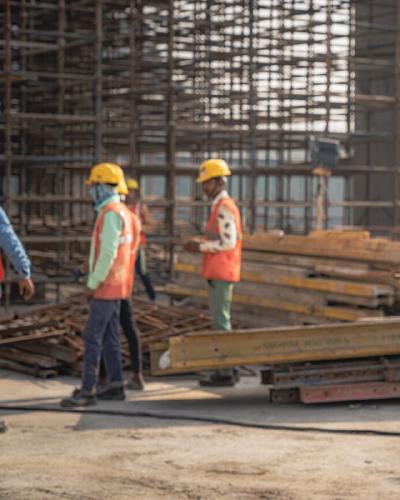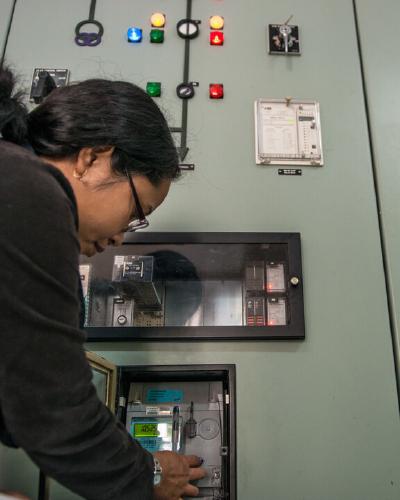Sweeping through India’s power sector are policy and market reforms that promote the wide use of renewable energy sources and improve the financial and service delivery performance of power utilities. ADB and Germany, through the KfW Bankengruppe, along with other partners, are supporting India’s transformational reform program.
Listen to the story
scaling up renewable energy
In 2019, India celebrated a major milestone: near-universal access to electricity. Today, with renewable energy expanding rapidly, India is on its way to achieving its updated nationally determined contribution targets. These targets include cutting the emissions intensity of its gross domestic product to 45% by 2030, down from its 2005 levels, and ensuring that half of its installed power capacity comes from non-fossil fuel–based energy resources, also by 2030. The ultimate aim: net-zero emissions by 2070. These bold targets required a strong push to resolve policy and market constraints and performance issues among power institutions.
Cheap and available, but poor-quality, domestic coal dominates the market. Existing long-term power purchase agreements between power distribution companies and coal power plants lock in coal usage, crowding out cheaper renewables. Meanwhile, India’s energy markets are still evolving. Robust markets for energy storage and grid support services necessary for the smooth integration of renewable energy sources are not yet in place, and battery costs remain high.
Compounding the technical hurdles are financial strains. Many distribution companies struggle with losses, often due to electricity theft, poor infrastructure, billing inefficiencies, and low consumer tariffs that fall short of recovering costs. State subsidies meant to bridge these financing gaps are often delayed, creating a cash crunch that ripples across the entire power supply chain and the broader economy.
To overcome these challenges, ADB and its development partners are working closely with the Government of India to accelerate the shift to clean renewable energy sources and achieve its ambitious climate targets.
“India has made great strides in achieving universal access to electricity. Now, India is focused on tackling the complex array of policy and market challenges that block the expansion of renewable energy. ADB is leveraging its experience, knowledge, and engagement with key stakeholders to support India’s renewable energy journey,” Jigar Bhatt, ADB senior energy project officer, said.
“ADB is leveraging its experience, knowledge, and engagement with key stakeholders to support India’s renewable energy journey.”

partnership for power reforms
In 2023, ADB launched a two-part program to support India’s initiative to enhance the financial health of its power distribution sector, improve service quality through competition and private sector participation, and promote the integration of renewable energy. The reform program, prepared in close consultation with KfW Bankengruppe, is backed by a policy-based loan and a technical assistance grant to build capacity, improve knowledge and skills, and develop analytical tools to guide power market reforms.
Germany, through KfW Bankengruppe, is providing parallel cofinancing for the program and a technical assistance grant to support implementation.
“Together with ADB, India and Germany are driving forward the green energy transition. Under the Indo-German Financial Cooperation, KfW is supporting the sustainable and inclusive energy transition in India on its path to carbon neutrality. Our coordinated approach with ADB showcases the importance of joint action for reforms,” Salih Yildirim, KfW principal portfolio manager, said.
The first subprogram completed all policy actions by March 2024.
Policy and Regulatory Reforms. These included institutionalizing power markets to allow advanced trading of renewable energy without long-term power purchase agreements. Distribution companies will be permitted to exit from power purchase agreements with coal plants that are more than 25 years old, while solar and other renewable energy plants for irrigation pumps will be deployed with urgency.
Improved Performance of Distribution Companies. The subprogram supports the Revamped Reforms-based and Results-linked Distribution Sector Scheme, which provides financial assistance to power distribution companies to improve their infrastructure, operational efficiency, and financial sustainability, based on meeting reform milestones and performance benchmarks. It offers additional fiscal space to enact crucial reforms, improve cost recovery and efficiency, and increase private sector participation. The subprogram has supported the establishment of a policy framework and rules for monitoring consumer service standards, including several gender and social inclusivity monitoring indicators.
These reforms not only boost operational efficiency but also create more space for private sector participation, helping to build a healthier and more competitive power sector.
The second subprogram, underway and set to conclude by December 2025, will advance power market reforms and expand distribution sector reforms at the state level.
knowledge and capacity support
ADB is also providing a technical assistance grant to sharpen India’s power procurement strategies, promote renewable energy integration, and enhance sector performance. The grant provides capacity development, knowledge transfer, and analytical tools to implement power market reforms by supporting the following outputs:
- Power procurement optimized
- General network access implementation for renewable energy supported
- Capacity expansion with demand response planned,
- Smart meter data analytics
- Consumer service standards monitored
- Environmental and social management systems for distributed renewable energy development
The Clean Energy Fund under the Clean Energy Financing Partnership Facility cofinanced the technical assistance project.
“The ADB–KfW partnership is helping to push the policy and market reforms needed to bring power distribution abreast with India’s power sector and perhaps contribute to the country’s commitments in the global fight against climate change.”

policies, progress, and performance
With the first phase of reforms completed, India is already seeing progress. Distribution companies are exiting long-term agreements with coal power plants over 25 years old, policies now support renewable energy use for sustainable hydrogen production, and new consumer rights, including gender and social inclusion indicators, are in place.
As the second phase unfolds, India’s power market is set to become more competitive and capable of integrating renewable energy at scale.
“India’s competitive power market, while well-developed, requires further improvements to integrate renewable energy effectively. The ADB–KfW partnership is helping to push the policy and market reforms needed to bring power distribution abreast with India’s power sector and perhaps contribute to the country’s commitments in the global fight against climate change,” Len George, ADB principal energy specialist, said.


